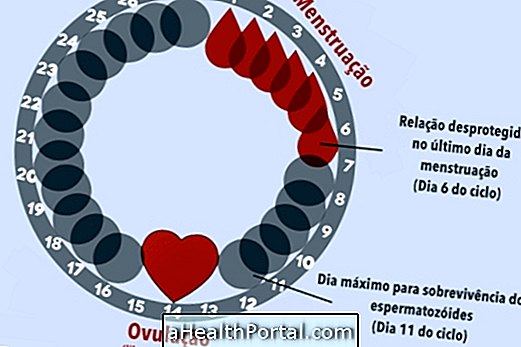Irregular menstruation is characterized by menstrual cycles that do not follow a similar rhythm every month, making it difficult to detect the fertile period and the best period to get pregnant. In general, menstruation varies from 21 to 35 days to go down, and is considered regular when it happens every 28 days. Here's how to find out if you're in the fertile time.
It is normal for menstruation to be irregular in the first 2 years after the first menstruation or in the period near the menopause, because they are moments of hormonal variations. In addition, the irregular cycle can be caused by several factors, from changes in diet, stress, excessive physical activity, gynecological diseases or changes in the production of hormones, for example.
Thus, if changes in the menstrual cycle are noticed, what should be done is to make an appointment with the gynecologist for a thorough evaluation to discover the cause and start the treatment.

What can make irregular menstruation
Some of the main causes of irregular menstruation are:
1. Changes in the contraceptive pill
The use of the contraceptive pill is a practical way to make menstruation regular, because it leaves the hormonal levels stable and according to the use of the tablets. When changing the type of contraceptive, the dose or when using it of irregular form can be variations in the levels of hormones, which interferes in the descent of the menstruation. Understand how it works and how to properly take the pill.
In addition, when you stop using the contraceptive pill, menstruation is regulated by the production of hormones in the ovaries, which may vary from woman to woman, and the cycle may not be exactly as it was when using the pill.
2. Hormonal changes
Changes in the production of female hormones may interfere with the menstrual cycle. Some diseases that cause this type of alteration are:
- Polycystic ovarian syndrome;
- Hypothyroidism;
- Hyperprolactinemia.
These diseases should be investigated by the gynecologist, through blood tests, whenever the menstrual cycle is irregular, especially when they are very delayed cycles.
3. Food changes
Eating disorders such as anorexia, as well as significant weight loss, can cause menstrual irregularities because they interfere with the ability to produce ovarian hormones, which is a way for the body to try to adapt to a lack of energy.
4. Excessive physical exercise
Excessive exercise, common in athletes, can cause changes or even discontinuation of the menstrual cycle. This happens because intense physical activities lead to the production of hormones, such as endorphins or ACTH, for example, that interfere with the rate of menstruation.

5. Gynecological diseases
Gynecological diseases such as endometriosis, uterine fibroids, tumors, or Asherman's syndrome, in which fibrosis forms in the uterus, for example, are diseases that cause abnormalities in the uterine tissue and can cause bleeding out of season or even absence of menstruation.
7. Stress
Stress, anxiety or emotional upheavals can generate the production of hormones such as adrenaline and cortisol, which interfere with the functioning of the menstrual cycle. Know the consequences of stress and anxiety to the body.
8. Pregnancy and breastfeeding
Pregnancy is the main cause of lack of menstruation, explained by the hormonal changes that are intense in this period, with the purpose of generating the baby. After delivery, during breastfeeding, the lack of menstruation persists, as hormones are also produced, such as prolactin, which inhibits the functioning of the ovaries and hampers the woman's fertility.
Chances of getting pregnant due to irregular menstruation
When the woman has irregular menstruation it becomes more difficult to calculate her fertile period. If she does not use any contraceptive method and maintains intimate contact with a man, she will be at risk of becoming pregnant. If this is not your wish, you should use some contraceptive method.
If the woman wants to get pregnant and has irregular menstruation, what can be done is to buy an ovulation test at the pharmacy to see if you are or not during your fertile time, so you know when to invest in intimate contact. Learn how to calculate the fertile period, even with irregular menstruation.























